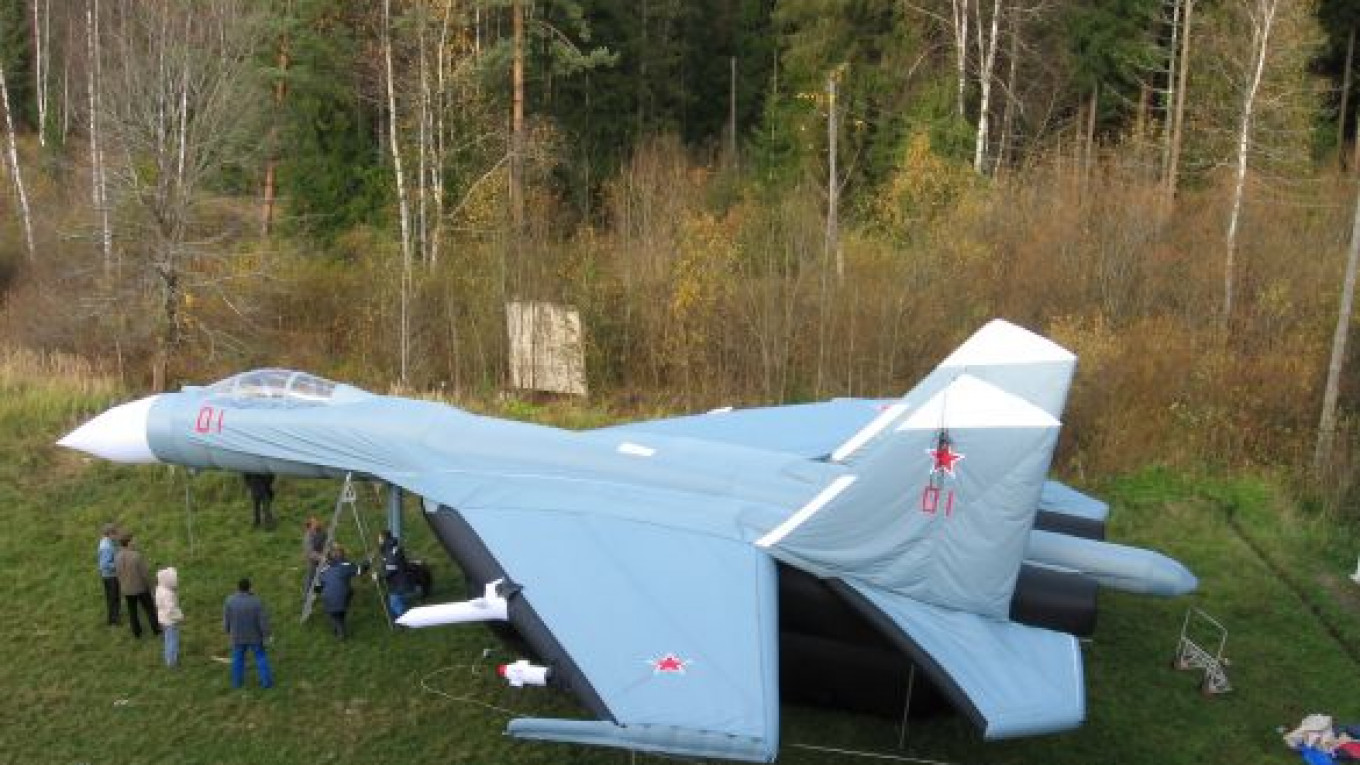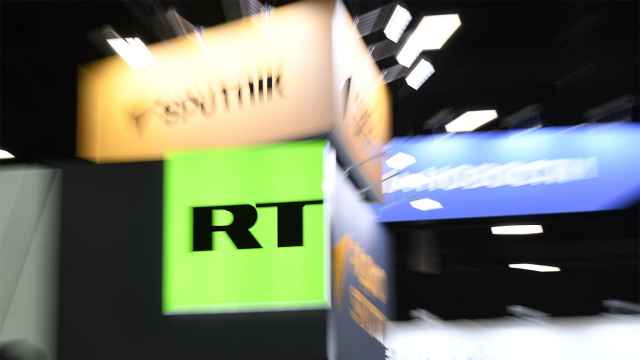As world military powers look to develop the biggest, baddest weapons, Russia's armed forces are toying with an alternative: inflatable missiles, tanks and planes.
Rusbal, a private Moscow-based company, makes inflatable S-300 missiles, T-80 and T-72 tanks, and Su-27 and MiG-31 fighter jets — all life-sized and, it says, extremely difficult to distinguish from the real thing when viewed by radar or satellite.
In an armed conflict, enemy pilots cannot discern immediately that the military equipment they are about to attack is fake, "and time is money," said Rusbal's marketing director, Viktor Talanov, whose father founded the company in 1993.
Further confusing the foe, the tanks, planes and missiles are built to appear authentic on thermal imagers, Talanov said in an interview.
The realism of the inflatables has attracted considerable interest not only from the military, which reportedly deployed test versions of the blow-up tanks during the 2008 conflict with Georgia, but also from Iran and other Middle Eastern countries, Talanov said.
The only differences between a real and inflatable tank are price and weight.
An inflatable T-80 tank runs for 187,000 rubles ($6,000), according to Rusbal's web site, while a real T-80, which is no longer produced, can cost $100,000 to $1 million depending on its condition.
Likewise, an air-filled tank weighs just 90 kilograms, making it a lot easier to deploy than a real T-80, which starts at 42 tons. (An inflatable S-300 missile battery weighs 120 kilograms, while the jets are the heaviest at 250 kilograms each.)
Rusbal, or Russkiye Ballony, was established two years after the Soviet collapse when Talanov's father, a former engineer in the defense industry, decided to manufacture hot air balloons together with two other retired defense engineers. Just two years later, in 1995, Rusbal started negotiations with the Defense Ministry to create inflatable military equipment, Talanov said. At the same time, the company conducted extensive research on whether it was possible to make a realistic-looking tank out of fabric.
Rusbal decided that it was and settled on Oxford cloth, a durable basket-weave pattern perhaps best known for its use in cotton dress shirts.
Rusbal has delivered trial samples of the inflatable military equipment to the military together with a full-color catalog of khaki-colored tanks and jets, Talanov said, adding that the company was waiting for a Defense Ministry order to start serial production.
The Defense Ministry press service had not replied by Monday to faxed questions sent Thursday.
The military used test models of Rusbal's tanks during the brief war with Georgia over its breakaway region of South Ossetia in 2008, the official government newspaper Rossiiskaya Gazeta reported in March.
Talanov said he was trying to confirm whether the tanks had been used. "We were trying to find out through our channels whether this is true. It seems that it is," he said.
He said the Defense Ministry has not given any clue as to how it has used or might use the inflatable equipment.
"The strategy of how to use these models is a secret, and the army doesn't disclose it," he said. "We can only fantasize together with you."
Inflatable military equipment could serve as effective decoys during armed conflict, said Ruslan Pukhov, a defense analyst with the Center for Analysis of Strategies and Technologies. He said the Yugoslav army successfully used wooden models of real military equipment while being bombed by NATO forces during the Kosovo War in 1999.
"Creating such systems, especially with an internal device that simulates a working engine, would increase the chances that the inflatable equipment is attacked instead of the real equipment," Pukhov said. "In a war, it might decrease losses significantly."
The enemy's financial losses also would be higher because the cost of a fake tank is incomparable to the $1 million or more spent on the missile used to attack it, he said.
Talanov said the prices for tanks and other equipment provided to the Defense Ministry would be higher than Rusbal's list prices because additional materials would be needed to make the deception more convincing.
"Special metallic fabric would be used in them to make them visible on thermal imagers," Talanov said, declining to provide exact prices.
As Rusbal waits for a military order, it has been flooded with interest from other countries, primarily Iran and its neighbors in the Middle East, Talanov said.
"They are very interested in the military equipment, but we can't supply it," he said, declining to provide additional information and referring questions to Rosoboronexport, the state arms exporter.
A Rosoboronexport spokesman declined to comment, citing the sensitivity of the issue.
The inflatable models, however, are not in demand with private individuals or companies because of the high price. "It's quite an expensive toy," Talanov said.
Defense toys are a sideline for Rusbal, which has a staff of 50 at its facilities in Khotkovo, a Moscow region town located about 60 kilometers northeast of the capital. Its main business includes inflatable trampolines shaped like castles for children, hot air balloons, pneumatic costumes and special orders for advertising campaigns.
Talanov said selling to companies based overseas made no sense for the company because of high customs duties and long delivery terms. "Foreigners come to us regularly, but we can't work with them because of the customs barriers," he said.
So Rusbal focuses on the domestic market — and every once in a while gets a fun customized order. Girl pop duo t.A.T.u ordered a pink tank with flowers and a blue fighter jet with clouds and red flowers on its wings for the group's performance at the Eurovision Song Contest in Moscow last year. Flanked by the tank and plane, the girls sang their “Not Gonna Get Us” hit together with a military choir serving as backup on the stage at the Olimpiisky stadium.
“We thought about including the pink tank and the blue jet in the catalog for the military," Talanov joked on his blog in February. "But we got frightened that the defense minister wouldn't appreciate the joke."
A Message from The Moscow Times:
Dear readers,
We are facing unprecedented challenges. Russia's Prosecutor General's Office has designated The Moscow Times as an "undesirable" organization, criminalizing our work and putting our staff at risk of prosecution. This follows our earlier unjust labeling as a "foreign agent."
These actions are direct attempts to silence independent journalism in Russia. The authorities claim our work "discredits the decisions of the Russian leadership." We see things differently: we strive to provide accurate, unbiased reporting on Russia.
We, the journalists of The Moscow Times, refuse to be silenced. But to continue our work, we need your help.
Your support, no matter how small, makes a world of difference. If you can, please support us monthly starting from just $2. It's quick to set up, and every contribution makes a significant impact.
By supporting The Moscow Times, you're defending open, independent journalism in the face of repression. Thank you for standing with us.
Remind me later.






